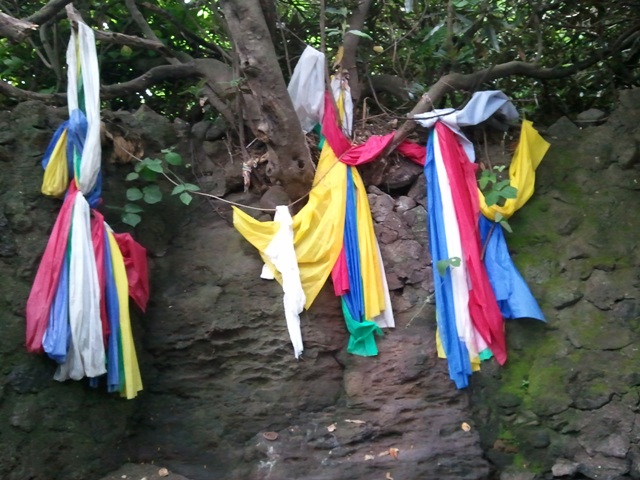 |
||
| A representative Jeju shamanic shrine (location withheld). Photo by Anne Hilty | ||
Gamunjang-Agi is a favorite among Jeju women.
Goddess of fate, the lesson she brings is one of a destiny that emerges from the very core of one's own being. This is a key element of Jeju culture – self-sufficiency, based on initiative, determination, courage, and self-assurance.
Her story begins with two beggar parents who, upon meeting and falling in love, marry and begin building a life together. Fate smiles upon them and they are able to lift themselves out of poverty. They have three daughters, the youngest one Gamunjang-Agi, and following her birth become exceedingly wealthy.
The parents have perhaps forgotten the lesson that they themselves embody: self-directed fortune. Surely they were not born of wealth, and met in the most unfortunate of circumstances; yet, they were able to create a prosperous life. Unmindful of this, however, one day they ask each of their daughters in turn a question, essentially designed to elicit a pledge of their filial devotion: To whom do you owe your existence?
Each of the first two daughters answers as one might expect, that it is all due to their parents. Gamunjang-Agi, however, has a different reply.
“Of course I owe you my love and devotion, dear parents,” she answers, “but my destiny is due to myself – in fact, to this small region beneath my navel.”
Indicating her lower abdomen, as if she has given birth to herself, she is also identifying the 'tantien' or 'lower burner' of Chinese Taoist medicine, the second chakra in Indian ayurvedic medicine, and the foundation of her torso – the base of her being.
Her parents, enraged at this seeming disrespect, cast her out of the house. A common motif in world mythology, this is the hero or heroine's rejection by family or community, having mistaken divinity for hubris.
Feeling regret, her mother gives her a black cow – a propitious sign in Jeju lore – with which to carry her few possessions. The mother also attempts to send Gamunjang-Agi, via first her eldest and then second sister, some rice to eat along the journey; the sisters, jealous, lie to Gamunjang-Agi in turn, for which she changes each into a loathsome object.
Even goddesses can have human emotions – and, reactions.
Gamunjang-Agi sets out on on what Joseph Campbell, renowned mythologist, would have dubbed 'the hero's journey'. She next comes upon the house of an old woman who has three sons.
 |
||
| Another representative Jeju shrine (location withheld). Photo by Anne Hilty | ||
Like her, it is the youngest son who sees her worth and is kind to her, following rejection by the elder two. A common motif in Jeju myths, and indeed in the world's mythology, is that of the youngest – the babe – as the source of wisdom. She marries him, magically gives him advantages and – once again in raw human emotion – curses his brothers, and she and her new husband become prosperous.
However, despite her good fortune the goddess carries with her a deep sorrow stemming from her parents' rejection, a rejection based in their ignorance rather than malevolence. She is also sad to learn that her parents' fortune has fallen since her departure, and that they have returned to being beggars – both blind, at that – just as they had been blind to their daughter's wisdom and worth.
Gamunjang-Agi devises a plan: she and her husband will give a party and invite all who live in the surrounding area, especially the poor and needy – with her parents in mind. They are among the last to arrive, and she is filled with worry in the meantime that they will not appear; when they do, she instructs the servants to tell them that there is no food remaining, but that if they will wait until all others have gone, there might be something for them.
Her parents, bemoaning their fate, are finally served food that, due not only to their blindness but also slovenly ways, they are unable to eat. She sees their poor condition and asks them their trouble; they in turn refuse to tell of their downfall, preferring to keep their pain and misfortune to themselves -- a characteristic of the stalwart Jeju people.
Finally, she reveals herself to her parents. Crying their sorrow over the loss of her and their ignorant rejection, they make amends, and their blindness lifts – coupled with their ability to see the truth of their daughter's divine identity.
For centuries, Gamunjang-Agi has been teaching Jeju people, in particular its women, that their fate – their destiny – is in their own control. All they must do is recognize, and own, this knowledge.
If one is without wisdom or insight into one's own life and being, one cannot recognize or achieve one's destiny.
–
Kim Soonie, Jeju native, is a mythologist and Jeju representative of the nation's Cultural Heritage Administration. Anne Hilty is a cultural health psychologist from New York who now makes Jeju Island her home. Interpretation / translation was provided by Han Youngsook, Jeju native and instructor at Jeju National University.
by Kim Soonie and Anne Hilty eastwest.psyche@gmail.com
<저작권자 © 제주위클리 무단전재 및 재배포금지>






